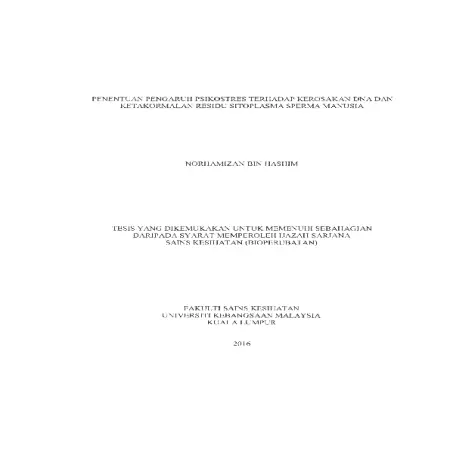Browse by Type
Results for Item type : "Thesis"
2020 (1)
|
|
Perkembangan hubungan perkahwinan pasangan kekal berkahwin dalam kitaran perkembangan keluarga
Item Type: Thesis
Editor:
Year: 00/00/2020
Abstract: The developmental perspective is one of the elements taken into account in the development of marital relationships in the family development cycle as it explains the process of transformation encountered by the lasting marriage couples chronologically, before marriage to ageing. Therefore, this study is inspired to explore the process of marital relationships development, the developmental tasks and challenges endured by the lasting marriage couples in the family development cycle through three research. questions. These questions are (I) What is the marital relationship development process of the lasting marriage couples in the family development cycle? (ii) How do the developmental tasks of the lasting marriage couples remain in each phase of development? and (iii) What challenges do the lasting
marriage couples faced during each phase of development? In addition to answer every question, the researcher employs qualitative research through hermeneutic phenomenology design. The researcher applies the purposive sampling method. This research involves 12 urban and rural couples that fulfilled the criteria. The researcher used three data sources which includes in-depth interviews, observations and
documents analysis. The data were analysed through the hermeneutic circle method and analyzed thematically using the Nvivo Plus 12 application. Overall, the study found 179 themes explaining the developmental process of marriage relationships, developmental tasks and strategies of achievement and also challenges facing married couples in the chronology of the development in marriage relationship in the family development cycle. This study proposes four phases of the development in marital relationships development in the family development cycle, namely (i) the premarital development phase; (ii) the early developmental phase of the marriage; (iii) the mid-marriage development phase; and (iv) the developmental phase of lasting
marriage. The four stages of the development incorporate eight transitional elements, ten roles and 22 marital relationship goals. Besides that, there are a total of 22 developmental tasks undergone by the lasting marriage couples in all four phases of development. The developmental task is a responsibility that must be fulfilled in marriage. In this research, the task of sustaining a marital relationship is one of the
most critical responsibilities couples do in every phases other than parenting duties and relationships with others, such as in-laws and communities. Implementation of development tasks involves 96 strategies. The main strategy used by couples to carry out duties of development involves elements of religion, love and affection and
responsibility. Lasting marriage couples also undergone 21 challenges according to the chronology of the developmental phase of the marriage relationship. The most common challenges faced by couples throughout the marriage are third-party intervention, financial and an unexpected event. Furthermore, the dyadic coping, which involves the cooperation of the couple in their marriage reflects the couples'
success through each phase of development. Hence, the outcomes of the research develop the conceptual model of the development of marital relationships in the family cycle, as a reference and guide in the field of marriage and family research. This study also proposes significant suggestions in developing future lasting marriage relationship research.
|
|
|
|
2018 (2)
|
|
Peranan sosialisasi ibu atau bapa komuter dipermudahkan dengan bantuan teknologi gajet dan media sosial: kajian kes di bangunan Ibu Pejabat LPPKN
Item Type: Thesis
Editor:
Year: 00/00/2018
Abstract: This study looks into the role of parents as the socialisation agent for their children in the lives of commuter families, which refers to the parents who do not live with their children due to distance and occupational demands. The rapid development of gadgets and social media technology such as the development of smart phones and
web 2.0 has allowed online social interactions made possible and can be used as a medium of change in being able to connect people who are at a distance from each other as seen in the case of commuter children and their parents. This study looks closely at how gadgets and social media technology helps parents of commuter families who work specifically at the LPPKN headquarters building and the role it plays
as a socialisation agent for their children. There are three research objectives in this study and they are as follows i) to explore the usage of gadgets and social media technology by parents in commuter families, ii) to identify the parenting style that is practiced by parents in commuter families when interacting with their children, iii) to analyse the effects of gadgets and social media technology on the role of parents in commuter families as the socialisation agent for their children. This study uses the qualitative approach through in-depth interviews and non-participant observation there are 10 participants involved in this study that was selected using purposive sampling. The symbolic interactionism and dramaturgy theory was used to explain the role of
gadgets and social media technology to the parents of commuter families and in helping them to understand their role in the socialisation of their children. Results from the study has shown that the use of gadgets and social media technology has definitely aided parents in commuter families' role in being the socialisation agent for their
children through online interactions. Other results include gaining insight to the authoritative parenting style that is executed in a democratic nature of commuter family parents and their consciousness towards the needs of their children. Besides that, the study has shown that gadgets and social media technology has given a positive effect towards parents of commuter families' role in being the socialisation agent for their children, in that it strengthens the bond and interactions between parent and child. This study has found that the use of gadgets and social media technology has enabled parents of commuter families to exercise their socialisation responsibilities towards their children through means of educating them and instilling moral values.
|
|
|
|
|
|
Parenting style and risk level of drug abuse among students in USIM
Item Type: Thesis
Editor:
Year: 00/00/2018
Abstract: Drug issue is a worldwide problem being faced by many countries and creates a complicated social problem including drug abuse among teenagers. This requires an aggressive corrective action by related agencies because it is getting rampant and has yet to be resolved. Nevertheless, society cannot always depend upon the related agencies to solve this problem. The family institution is believed to also have a role to prevent or reduce the drug abuse rate in teenagers. Looking on this aspect, the parenting style is important in shaping good character in behavior, interest, goals, and beliefs of the teenagers. A total of 121 Tamhidi students in USIM involved as respondents for the present study. Each respondent was given a questionnaire with 60 questions, represented by three sections which are - A: Demography; B: DAST-20; and C: Parenting Style. Results revealed that gender has a significant difference (p<0.05) on sociodemographic characteristic. However, no significant difference (p>0.05) were observed on the age, parent marital status, and family household. On the other part of the study, significant difference (p<0.05) was observed on the parenting style. Authoritarian style of parenting has recorded with a low-risk (46.3%) drug taking by the respondents followed by permissive parenting style (25.0%). The analysis also revealed that respondents with parent who are applying the authoritative parenting style had no-risk of possibility on taking drug (96.7%). In summary, socio-demographic attribute on gender and permissive parenting styles has been associated with high-risk drug abuse among respondents in the present study.
|
|
|
|
2016 (1)
|
|
Penentuan pengaruh Psikostres terhadap kerosakan DNA dan ketakormalan residu sitoplasma sperma manusia
Item Type: Thesis
Editor:
Year: 00/00/2016
Abstract: Idiopathic infertility has been correlated with psychostress which can result in abnormality and declining semen quality in men. Nevertheless, direct relationship of semen quality and psychostress is still unclear. Hence, this study was conducted to evaluate the effect of psychostresson semen quality with emphasizing on sperm DNA damage and cytoplasm droplet abnormality. A total of 628 respondents were selected randomly among men aged between 25-45 years old were patient from LPPKN.
|
|
|
|








